The Independent's journalism is supported by our readers. When you purchase through links on our site, we may earn commission.
Why the Canary Islands should be your next holiday destination for winter sun
Here’s how to enjoy the best of the warm temperatures, volcanic peaks and Atlantic shallows that the cluster of Canaries has to offer
Your support helps us to tell the story
From reproductive rights to climate change to Big Tech, The Independent is on the ground when the story is developing. Whether it's investigating the financials of Elon Musk's pro-Trump PAC or producing our latest documentary, 'The A Word', which shines a light on the American women fighting for reproductive rights, we know how important it is to parse out the facts from the messaging.
At such a critical moment in US history, we need reporters on the ground. Your donation allows us to keep sending journalists to speak to both sides of the story.
The Independent is trusted by Americans across the entire political spectrum. And unlike many other quality news outlets, we choose not to lock Americans out of our reporting and analysis with paywalls. We believe quality journalism should be available to everyone, paid for by those who can afford it.
Your support makes all the difference.An archipelago of eight sun-drenched islands 100 miles off the north west shoulder of Africa make up the Canary Islands on the Atlantic Ocean.
Chiefly celebrated for year-round vitamin D and playas that rival the Balearics, a geology lesson of landscapes inland transcend even the bright lights of Canaries coastal resorts.
The Spanish islands, each as dynamic as the next, offer endless active pursuits, beaches to bathe and cultural adventures to cement their popular position as the place to get away for Brits – five are even listed as Unesco biosphere reserves for their unusual flora and fauna.
Whether tucking into elevated plates of tapas, hiking steep lava fields or doing some serious stargazing, the Canaries masterfully balance budget travel with Michelin-quality luxury for trips that are sure to surprise you.
From holiday hotspot Lanzarote to under-the-radar La Gomera, here’s where and how to find winter sun and summer holiday getaways on the Canary Islands – just over a four-hour flight from the UK.
Read more: This Canary Island resort is a haven for active travellers – and surprisingly good for toddlers too
Best Canary Islands holidays
Tenerife

What to do in winter: Take a whale-watching boat trip, hike in the Anaga Mountains and see snow atop Mount Teide
Tenerife is sandwiched between the Sahara and the Atlantic, with tropical forest trails in Parque Nacional Las Cañadas del Teide, journeys into the arteries of a dormant volcano, Mount Teide and Europe’s first Whale Heritage Site, home to 28 species of cetacean. All can be explored during four seasons of sun.
Though well-catered for budget-friendly package holidays, the Canary Island disputes its sour rep as a cheap spot primed for British pubs and tomfoolery with its leafy canopy and wild west coast that remain relatively untouched by tourism. It’s also the ideal spot to see the stars, with clear skies, clean air and high altitudes. Tenerife knows how to attract Brits, with golden sands imported from Western Sahara for sprawling beach fronts, and the popular Siam Park even opening in winter for sun seekers visiting the largest of the Canaries.
Read more: Best luxury Tenerife hotels
Where to stay
Royal Hideaway Corales Suites offers a home-from-home for holidaymakers in the fishing village of La Caleta. The resort has luxe suites on the beach, three heated saltwater pools and Michelin-starred restaurant El Rincón de Juan Carlos – all designed by local architect Leonardo Omar to mimic a sea cave.
Read more: The best beaches in Tenerife
Gran Canaria

What to do in winter: Trail Pico de las Nieves, watch the Geminids meteor showers and go golfing in the south
Known as the “miniature continent” for its contrast of volcanic calderas, urban beaches and imposing heights, Gran Canaria sits in the centre of the Canary Islands archipelago. Black and white southern sands dot Playa del Inglés, Puerto de Mogán and Puerto Rico, and the stylish Meloneras waterfront presents an oasis for holidaymakers shopping, eating and watching the sun go down.
To jump in feet first, the 75km Gran Canaria Camino path walks coast to coast from Maspalomas in the south to Santiago de los Caballeros in the north crossing dunes and lush forest as you tread the diameter of the circular island – enviable temperatures (average daily highs of 24C) and fresh banana snacks are sure to help with the journey.
Where to stay
Santa Catalina, a Royal Hideaway Hotel, is a hotel dating back to 1890, built in Santa Catalina’s distinctive pink. It’s just a short stroll from the old town, Vegueta, and the city’s main beach. Neoclassical rooms feature wooden balconies, ambient lighting and comfortable beds for some R&R before tucking into an extravagant breakfast buffet.
Read more: The best things to do in Gran Canaria
Lanzarote
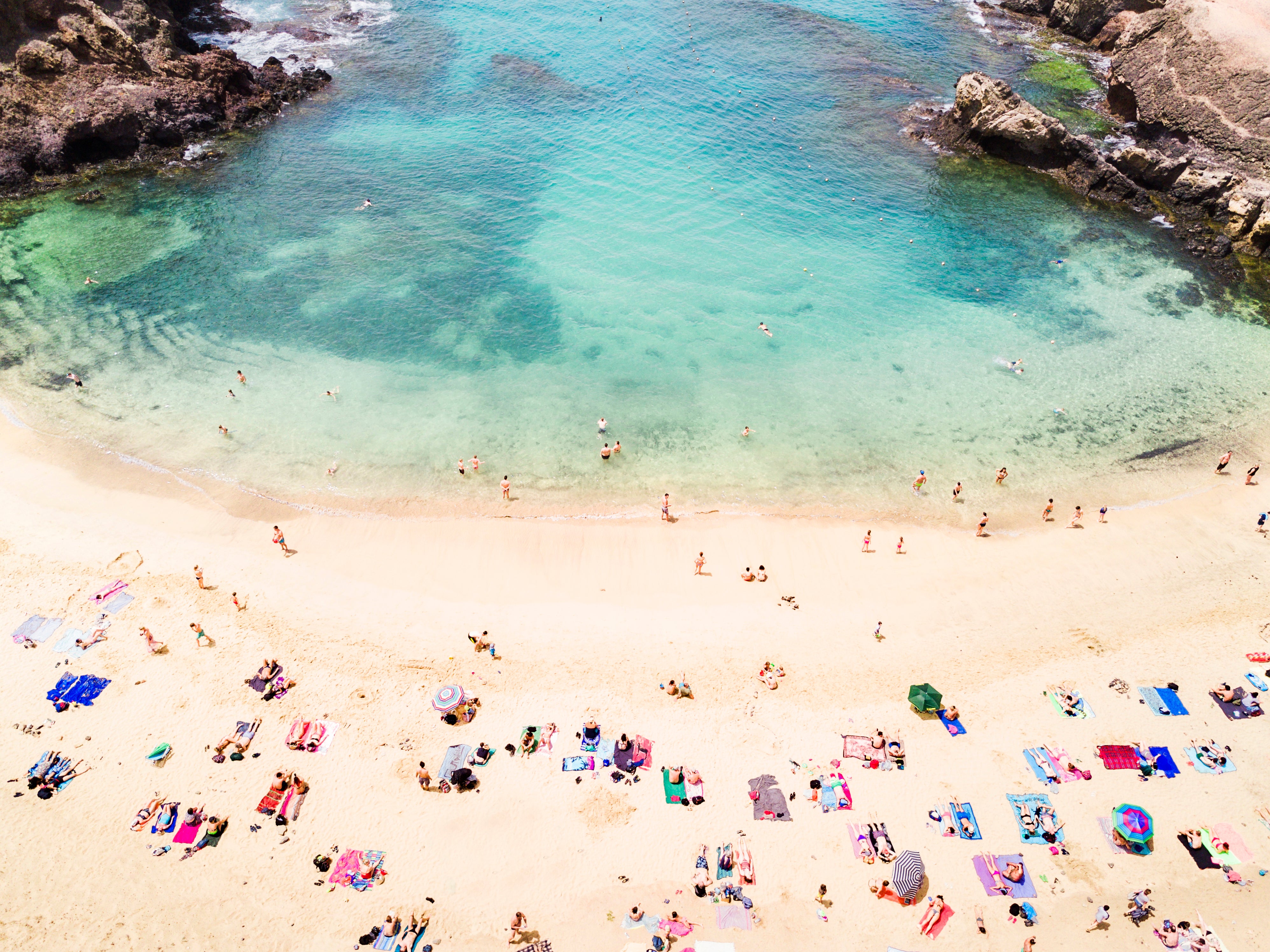
What to do in winter: Tour the Timanfaya National Park, cycle the Ironman Lanzarote route and wine taste in La Geria
With clear, shallow waters, palm-lined promenades and rows of parasols, Lanzarote has smartened up its image from tacky tourism to luxury travel. Famed as the most popular Canary for holidaymakers, a new wave of chic boutiques, clean beaches and well-equipped resorts awash with international restaurants now sit below the island's dramatic crimson mountains.
Visit Papagayo Beach on the island’s southern tip for a tan top-up by powder sand and emerald waters or tour Timanfaya National Park's lunar landscapes for otherwordly views of the entire island. Playa Blanca, Puerto del Carmen and Costa Teguise are ideal for families visiting the usually rain-free isle but hidden in rural whitewashed villages are the jewels in Lanzarote’s crown. Peppered with hamlets, country bodegas and the vineyard belt of La Geria, tourists are attracted to the lava field landscape and benign climate inland, and on the sparkling coast, in every season.
Where to stay
H10 Rubicón Palace, in the heart of Playa Blanca, is a family-friendly resort with five different dining venues, spacious suites to sleep your whole clan and a village atmosphere. A hotspot for sunsets, nightly shows, multi-sports courts and themed meals greet guests heading for the white sand stretch of Lanzarote.
Read more: The best beaches in Lanzarote
Fuerteventura
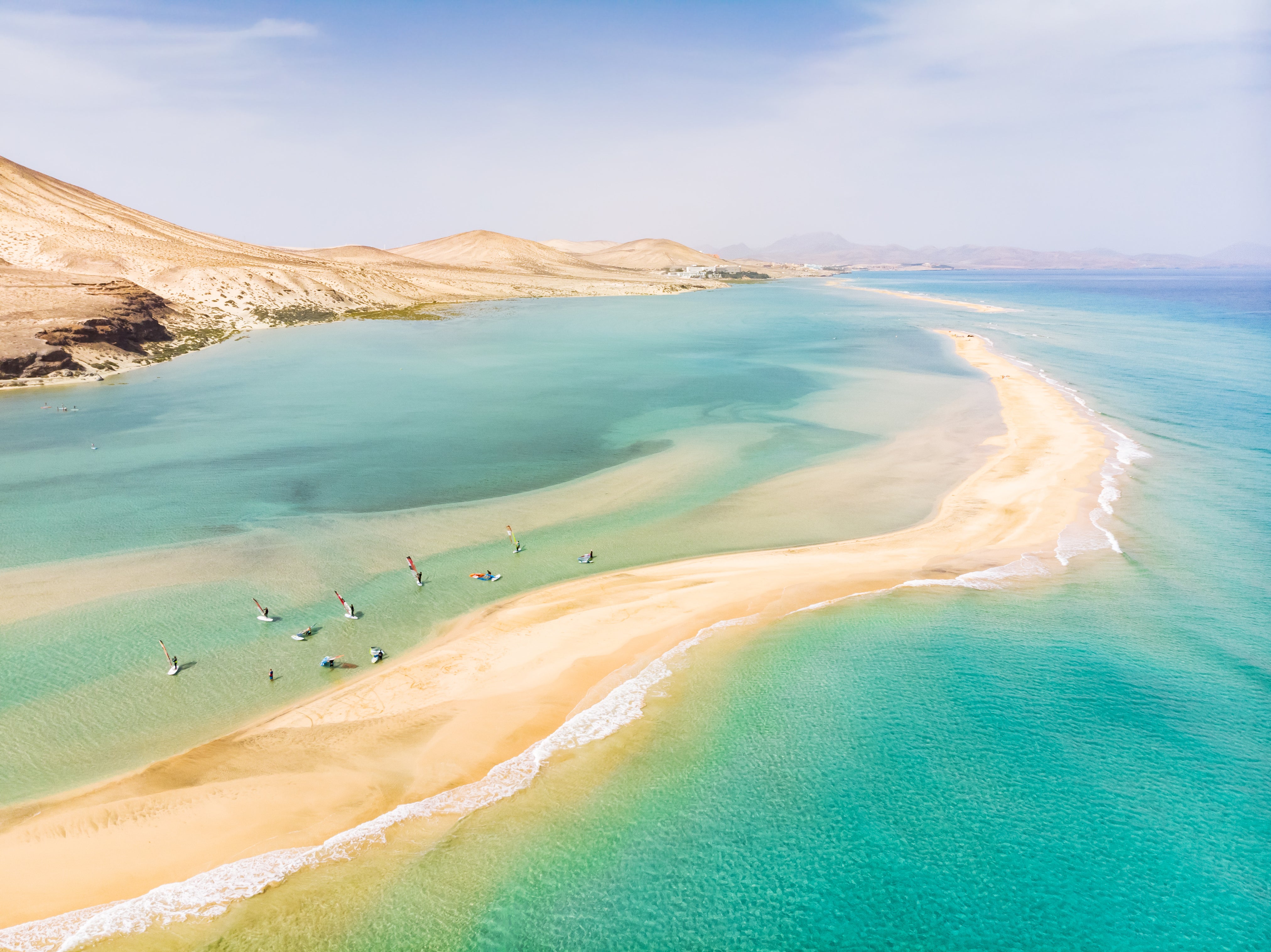
What to do in winter: Visit Lobos island, offroad in the Corralejo Dunes Park and take a dolphin safari
Travellers flock to the coast of the Canary's oldest island, Fuerteventura, year-round for surfing and watersports. Swathes of holiday-brochure sand line the coast formed over 22 million years ago, and the isle is blessed with breaks and swells for riding the waves and a relaxed vibe to match the surf scene.
On the southwest tip, Sotavento Beach’s 9km stretch is a hub of wind and kite surfing, and famous north shore breaks in beach-chic Corralejo are hailed as Europe’s answer to Hawaii for surfing.
Beneath the volcanic mountains, the hills are scattered with traditional windmills, Aztec-inspired churches and ochre colonial mansions. Think kitesurfing, buggy driving, and mountain hikes to volcanic wine cellars on a Fuerteventura holiday.
Where to stay
If stylish boutique hotels accented with white and blue, a sheltered beach and a classic Spanish restaurant are what you desire from a Fuerteventura holiday, then the Avanti Lifestyle Hotel should fit the bill. Originally opened in 1969, 14 terraced bedrooms are available for adults only to kick back in Corralejo after days spent diving into watersports.
Read more: Best hotels in Fuerteventura for a holiday – from beach-facing balconies to boutique breaks
La Palma
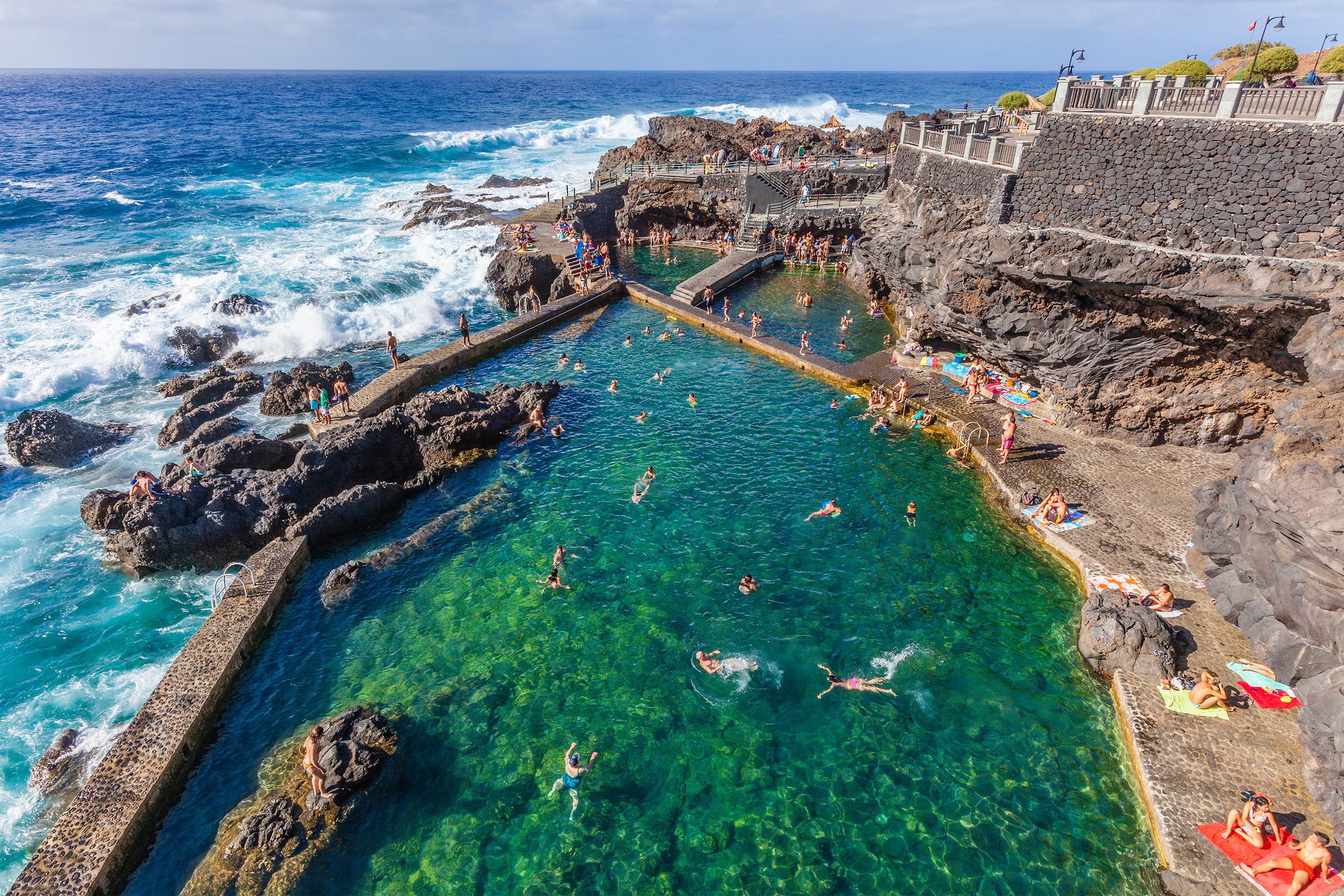
What to do in winter: Walk the UNESCO biosphere reserve, stargaze at the Roque de Los Muchachos Observatory and wet your palette at the Bodegas Teneguia winery
The isle bonita, the “pretty island”, of La Palma is a subtropical paradise marked by lava scars from its active Tajogaite volcano. Since its last eruption devastated Palermos in 2021, the ashy shore has found its place in the archipelago’s tourism arena with seismic volcano-themed tours and cruises around its corrugated coast.
The lushest of the Canaries and considered one of the world’s steepest islands, this naturally diverse destination is best appreciated on foot, with high altitude hiking on La Palma’s central peaks a priority over lounging shoreside and the wild nightlife you’ll find in Tenerife or Lanzarote.
However, for a break from your step count, Los Cancajos, a small resort near the island’s attractive capital Santa Cruz de La Palma (the most established tourist town), is dotted with black sand beaches, shallow bays and bistros serving papas bonitas (wrinkled potatoes with Canarian mojo verde sauce) for a taste of a classic postcard holiday.
Where to stay
Hotel San Telmo in Santa Cruz de La Palma features charming 17th-century decor with 21st-century comfort and it’s ideally situated for a countryside hike. Reading in the garden solarium and feasting on freshly prepared bread at breakfast are also on the itinerary for guests.
La Gomera
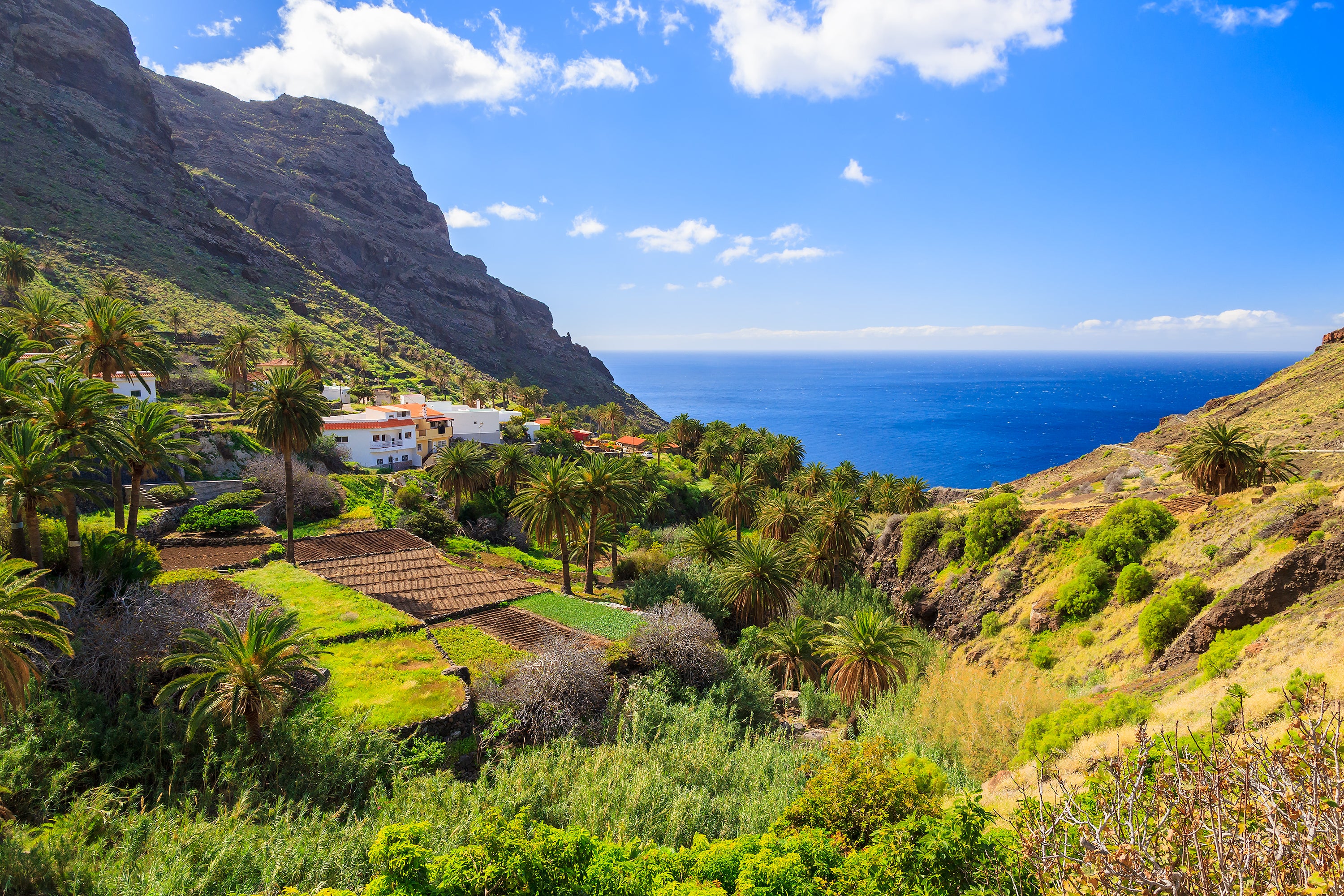
What to do in winter: Explore the Garajonay National Park, see San Sebastian and taste ‘almogrote’ paste on toast
La Gomera, a peaceful land of walking and whistling, is the second smallest of the main isles, and the hiker’s haven is a dream for a winter walking holiday. Only 15 miles wide, the “little sister” to Tenerife (which is a 50-minute boat ride away) packs a punch with its breathtaking range of scenery. In fact, the gorges are so steep on the island that the El Silbo whistling language developed on La Gomera so farmers could communicate across its deep ravines.
The island is studded with palms on its west coast, black sands at Valle Gran Rey, lush green valleys and fruit plantations in the north, and hiking trails through the misty Garajonay forest that tops a tenth of La Gomera, and this Canary is quickly becoming a foodie hotspot. Imaginative culinary delights, from melon lobster to marmalade rabbit, put a twist on Spanish classics, with goat cheese and dried figs drizzled with palm honey and cazuela, a herb-heavy fish stew, also making the menu. The playground for dolphins has exceptional local fish offerings of sama, cherne and tuna, while terraced vineyards surrounding Vallehermoso and Hermigua take centre stage for pours pairing whites with the local bites.
Where to stay
The four-star Hotel Jardín Tecina offers an outdoor pool, hot tub and terraced rooms laid out like a traditional Canarian village. It’s just a short drive from world-class golf courses, and the tranquil flower gardens bring in views of Mount Teide – all just steps from Santiago Beach.
El Hierro
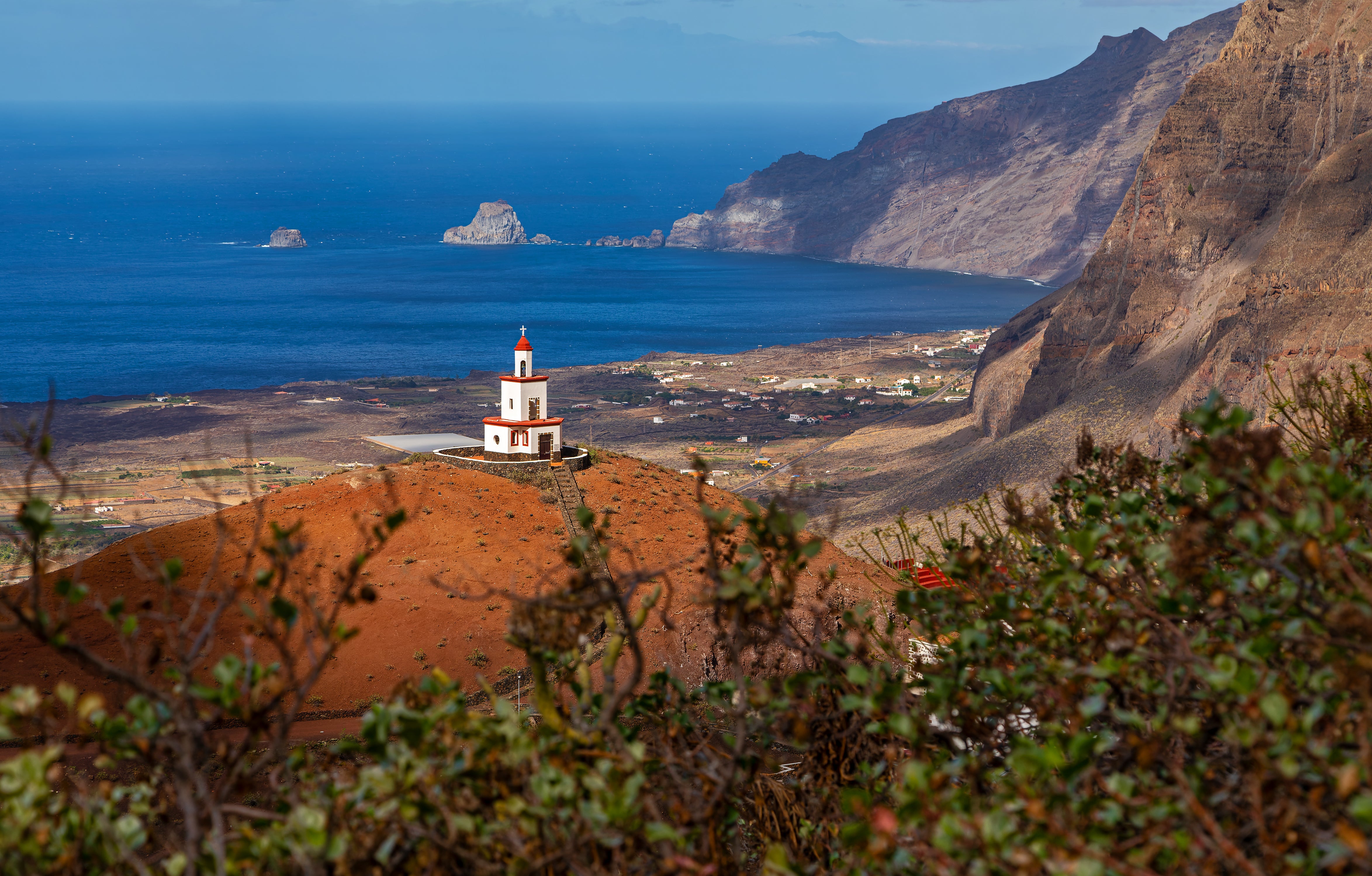
What to do in winter: Hike the Camino de Jinama, visit the Ecomuseum of Guinea and feast on dessert quesadillas
The smallest and most remote Canary Island, El Hierro is a ferry or flight from Tenerife and the edge of Europe isle was once viewed as the “end of Earth”. Not usually a magnet for mass tourism, this tiny island is scattered with dramatic volcanic deserts, ancient forests, lava fields, banana plantations and wind farms – aiding ambitions for self-sufficient energy.
Now a protected Unesco biosphere reserve, El Hierro’s unpolluted waters are a paradise for scuba diving, with the crystalline depths of Mar de Las Calmas attracting all manner of marine life. In the coastal villages of La Caleta and El Tamaduste, natural pools for swimming are backdropped by a rugged cliffside with holiday cottages nestled atop for panoramic views from the southernmost point of Spain.
On land, hiking, mountain biking and la lucha Canaria (Canarian wrestling) meet the quadrennial festival Bajada de la Virgen de los Reyes – an 18-mile pilgrimage winding the tracks of Valverde since 1741 – to ask for rain in a drought by carrying the Virgin of Los Reyes (the island’s patron saint) in a lively procession to the capital.
Where to stay
On the coast of El Golfo Bay, Balneario Pozo de la Salud backed by high cliffs oozes calm and relaxation. At the laid-back accommodation, there’s a spa that features clinical and aesthetic treatments, plus sprawling sea views of the Atlantic from modern suites and the on-site restaurant.
Read more: The best hotels in Tenerife for family-friendly holidays and luxury stays
